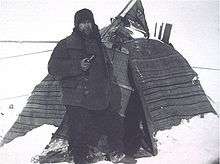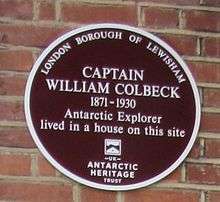William Colbeck (seaman)



William Colbeck (1871–1930) was a British seaman who distinguished himself on two Antarctic expeditions.
Biography
William Colbeck was born on 8 August 1871, in Myton Place, Hull. He was the fifth child in a family of ten born to Christopher Colbeck, a baker, and his wife Martha.[1] Educated at Hull Grammar School, Colbeck served a merchant navy apprenticeship between 1886 and 1890, earning his second mate's certificate in 1890, first mate's certificate in 1892, master's in 1894 and extra master's in 1897. He was awarded a Royal Navy reserve commission in 1898. In that year he was invited by the Norwegian Carsten Borchgrevink to join the Southern Cross Expedition to the Antarctic. This would be the first expedition to overwinter on the Antarctic mainland; Colbeck took charge of the expedition's magnetic observation work.[2]
After returning to England in 1900, Colbeck was soon going southward again, this time in command of the relief ship Morning, sent to resupply Captain Scott's Discovery, then trapped in the ice at McMurdo Sound in the Antarctic.[3] He was awarded the Royal Geographical Society's Back Award in 1901.[4]
On their way south the Morning celebrated Christmas Day 1902 by crossing the Antarctic Circle and discovering a previously uncharted island which they named Scott Island. Colbeck and three officers landed on the island where they collected rock samples and had a drink. The adjacent cone-shaped islet Colbeck named Haggitt's Pillar, after his mother's maiden name.
In January 1904 Colbeck returned with Morning, this time with firm instructions that unless Discovery could be speedily released from the ice, she was to be abandoned; Colbeck was to bring Scott and the expedition home. In a race against time, and with a fortunate shift in ice conditions, Discovery was freed and sailed safely home.[5]
Thereafter Colbeck made no further Antarctic ventures but resumed his job with the Wilson line in Hull. In 1914 he went to work for the United Shipping Company of London, ultimately becoming their Marine Superintendent. The family moved to London, living at 51 Inchmery Road, Catford. Captain Colbeck became a founder member of the Honourable Company of Master Mariners. [1] In 1930 he was elected President of the Antarctic Club but died suddenly later that year. He is buried in Hither Green Cemetery.
William Colbeck married Edith Robinson and they had four sons. One of these, William Robinson Colbeck (1906–86), joined the British Australia and New Zealand Antarctic Expeditions of 1929-1931 as second officer and navigator in the old Discovery. He was responsible for much of the charting during the two voyages and the Colbeck Archipelago off the Mawson Coast is named after him.[6]
Legacy
His work in the Antarctic was commemorated by the naming of Colbeck Bay at 71°38′S 170°5′E / 71.633°S 170.083°E and Cape Colbeck on the King Edward VII peninsula, at 77°07′S 158°01′W / 77.117°S 158.017°W. A plaque was placed on the site of his residence at 51 Inchmery Road, SE6 in September 2016.[7] In the same year, a plaque was installed at Hull Paragon station, jointly commemorating Colbeck and Alfred Cheetham (1866-1918): 'Two of many Hull seafarers on the ship Morning who participated in the Antarctic expeditions to relieve Captain Scott 1902-1904 and were welcomed by thousands at this station on their return'.
References
- 1 2 "Rescuing Scott of the Antarctic: Hull captain William Colbeck and his journeys to the ends of the earth". Hull Daily Mail.
- ↑ Borchgrevink, Carsten (1901). First on the Antarctic Continent. George Newnes Ltd. Retrieved 11 August 2008.
- ↑ Crane, pp. 232–40
- ↑ http://www.forgottenbooks.com/readbook_text/Year-Book_and_Record_1000706739/43
- ↑ Crane, pp. 277–87
- ↑ Maritime Historical Studies Centre.The Colbecks. Retrieved 21 July 2014
- ↑ "Captain Colbeck's Plaque".
Sources
| Wikimedia Commons has media related to William Colbeck. |
- Borchgrevink, Carsten (1901). First on the Antarctic Continent. George Newnes Ltd. Retrieved 11 August 2008.
- Crane, David (2005). Scott of the Antarctic. London: HarperCollins. ISBN 0-00-715068-7.
- Maritime Historical Studies Centre. "The Colbecks" (PDF). Retrieved 21 July 2014.
- Pass notes, The Guardian. " No: 1801 Captain Scott". Retrieved 21 July 2014.
- Margolies, Sandra. "'Captain William Colbeck: from Hull to Catford via Antarctica', Lewisham History Journal, 22 (2014), pp. 32-57".
- Shepherd, Rupert. "Captain Colbeck's Eggs".
- Shepherd, Rupert. "Captain Colbeck's Plaque".